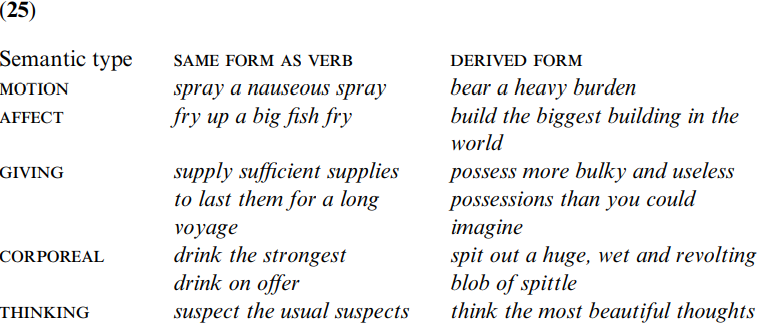


 Grammar
Grammar
 Tenses
Tenses
 Present
Present
 Past
Past
 Future
Future
 Parts Of Speech
Parts Of Speech
 Nouns
Nouns
 Verbs
Verbs
 Adverbs
Adverbs
 Adjectives
Adjectives
 Pronouns
Pronouns
 Pre Position
Pre Position
 Preposition by function
Preposition by function 
 Preposition by construction
Preposition by construction
 Conjunctions
Conjunctions
 Interjections
Interjections
 Grammar Rules
Grammar Rules
 Linguistics
Linguistics
 Semantics
Semantics
 Pragmatics
Pragmatics
 Reading Comprehension
Reading Comprehension|
Read More
Date: 2023-03-27
Date: 2023-03-29
Date: 2023-08-04
|
One variety of nominalization, Object-nom, can function as object for the verb from which it is derived—dream a dream (where the Object-nom has the same form as the verb) or pay a payment (where the forms differ). Note that these are not ‘patient’ nominalizations (dream and payment are not patients); they relate to the syntactic function of object, rather than to a semantic role.
As mentioned, such ‘cognate objects’ are in fact seldom used as is, but generally require one or more modifiers which provide significant extra information in the object noun phrase (over and above that conveyed by the verb). For example, I dreamed the horrible and frightening dream (or the first line of a well-known song, To dream the impossible dream) rather than just I dreamt a dream, and He paid the rather steep but unavoidable down-payment on the house rather than just He paid the payment. Here are some examples of Object-nom’s, with sample modifiers:

Other Object-nom’s of this type include plant, smoke, sell, taste, feed/ food, favor/favorite, and derivations ending in -ee, such as employee, nominee, appointee. Some nominalizations are used in plural form; for example, supplies in (25) and nibbles, as in I nibbled the most delicious oriental nibbles at that cocktail party. And there are also nominalizations which may be used as peripheral arguments: for example, The American tourist tipped the taxi driver with a most generous tip (and similarly for reward and bribe, among others).
The verbs mentioned so far are fully transitive, with the nominalization available for object (or indirect object) slot as alternative to a non-cognate form; for example, one can say either He drank a black coffee or He drank the strongest drink on offer. As discussed, there are also a number of verbs, most from the CORPOREAL (and a few from the WEATHER) type, which are basically intransitive, and can only be followed by a noun phrase (in apparent object function) when this has an Object-nom as head. For example:

Other verbs of this type include laugh, cough, sneeze, yawn and wink.
Using a verb with an Object-nom, even with heavy modification in the object noun phrase, is not common in formal style. It is probably most acceptable when the nominalization has a derived form, as different as possible from the verb (for example, bear and burden, where the derivation goes back to Old English). But collocations such as those in (25)–(26) are common in colloquial speech and in spoken rhetoric.
An Object-nom is most frequently found with a verb other than that from which it is derived, but with a similar meaning; for example, apply a spray, carry a burden, cook up a fish fry, erect a building.
There are a number of further Object-nom’s which are scarcely likely to function as object of the verb on which they are based, even in the most colloquial speech (although, with ingenuity, contexts could well be devised for them). However, they can be equated (by copula be) with the object of the verb. For example:

Object-nom’s of this type include those formed with -(t)ion (others are selection, proposal and supposition) and convert, discovery, choice. And also view—We viewed the forest from the window implies that The view from the window is the forest.
Some derived forms may function both as a Unit-nom, as in (28a), and as an Object-nom, as in (28b):

However, one cannot have both simultaneously. That is, *John’s gift of [a most generous gift] to Mary . . . is quite unacceptable.
And building, for example, can be an Activity-nom, as in (29a), or an Object-nom, as in (29b):

Again, we cannot have both at once—*John’s building of [a tremendously high building] took a long time is scarcely acceptable.
An Object-nom can generally be in possessive relation with the erstwhile A argument of the verb, if this satisfies the conditions for taking ’s (or if it is a pronoun with animate reference). Besides the examples given in (3) and (5) there are my burden, the rich tourist’s tip, Mary’s thoughts, John’s assumption.
|
|
|
|
تفوقت في الاختبار على الجميع.. فاكهة "خارقة" في عالم التغذية
|
|
|
|
|
|
|
أمين عام أوبك: النفط الخام والغاز الطبيعي "هبة من الله"
|
|
|
|
|
|
|
قسم شؤون المعارف ينظم دورة عن آليات عمل الفهارس الفنية للموسوعات والكتب لملاكاته
|
|
|